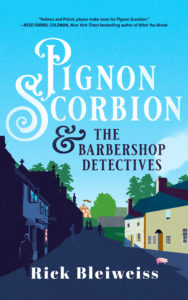 Pignon Scorbion & the Barbershop Detectives by Rick Bleiweiss
Pignon Scorbion & the Barbershop Detectives by Rick Bleiweiss Series: Pignon Scorbion #1
Published by Blackstone Publishing on February 8, 2022
Source: NetGalley
Genres: Historical Mystery
Pages: 300
Format: eARC
Purchase at Bookshop.org or Audible
Add on Goodreads

The year is 1910, and in the small and seemingly sleepy English municipality of Haxford, there’s a new chief police inspector. At first, the dapper and unflappable Pignon Scorbion strikes something of an odd figure among the locals, who don’t see a need for such an exacting investigator. But it isn’t long before Haxford finds itself very much in need of a detective.
Luckily, Scorbion and the local barber are old acquaintances, and the barbershop employs a cast of memorable characters who—together with an aspiring young ace reporter for the local Morning News—are nothing less than enthralled by the enigmatic new chief police inspector.
Investigating a trio of crimes whose origins span three continents and half a century, Pignon Scorbion and his “tonsorial sleuths” interview a parade of interested parties, but with every apparent clue, new surprises come to light. And just as it seems nothing can derail Scorbion’s cool head and almost unerring nose for deduction, in walks Thelma Smith—dazzling, whip-smart, and newly single.
Has Pignon Scorbion finally met his match?
For fans of Sherlock Holmes and Agatha Christie’s Hercule Poirot, author Rick Bleiweiss’s quirky new detective and ensemble cast of characters set against the backdrop of small-town England in the 1910s, will feel both comfortingly familiar and thrillingly new.
I expected to thoroughly enjoy Pignon Scorbion & the Barbershop Detectives. It features a chief police inspector but is at heart a cozy mystery set in a small town in England in 1910. Unfortunately, it didn’t really work for me.
Scorbion, is a dapper, overly observant detective, à la Poirot. He is a little more aware of other people’s feelings and actually has a love interest, but he didn’t stand out for me. There are a lot of characters, the folks at the barbershop, the local bookseller, the townspeople involved in the cases. There were too many for any to have more than one or two defining characteristics – this one’s short, this one is from France, this one is “modern.” I didn’t really care about any of them.
The mysteries were okay. They’re solved through interrogations at the barbershop, with a few behind-the-scenes phone calls from the police station. The flow wasn’t great, but there were a couple of interesting twists. The workers at the barbershop and a local reporter get to do some of the questioning, but clearly only Pignon is smart enough to put it all together. Eh.
The thing that disappointed me most was how stilted the writing was. It felt like the author was trying to use the writing style to place the book in 1910, but the dialogue is clunky and in general, it’s just overdone. I should probably stop reading books that are compared to Christie’s, they never live up to the hype.
The set-up is so promising, it’s a shame it didn’t live up to it.

A shame this didn’t work for you. I thought it sounded like a promising read but the misgivings you have about the book are exactly the kind of things that I am critical of; the writing style not being suitable for the era/place a book is set in being a particular bug-bear of mine.